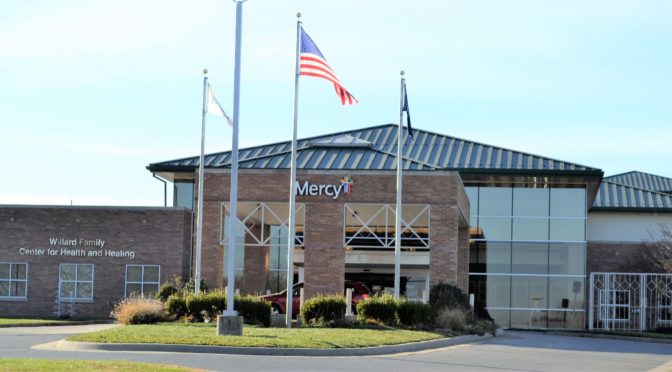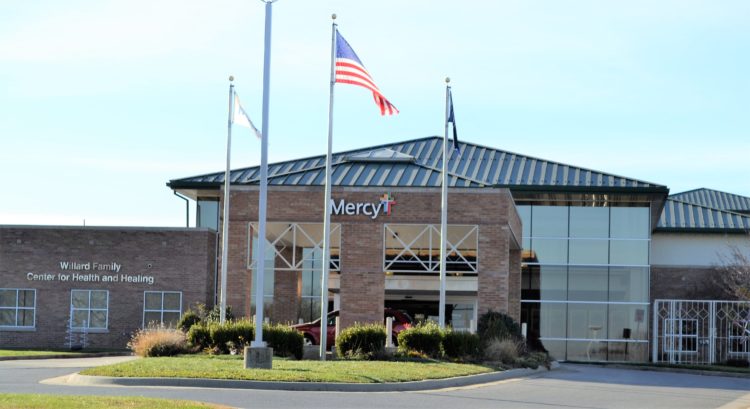A good local health care system may itself be part of the prescription for maintaining a healthy rural economy.
In the year 2016, the healthcare sector accounted for an estimated 13.1 percent of Bourbon County’s total employment or about 1,246 jobs. In that same year, over one in four healthcare sector workers were employed at Mercy Hospital Fort Scott.
Those are just a couple of the finding published in a recent study by researchers at K-State Research and Extension and sponsored by the Kansas Hospital Association documenting the economic impact of the healthcare sector on a county-by-county level.
The report also noted that Mercy Hospital Fort Scott has a significant “ripple effect” or secondary impact on employment and income throughout other industries in Bourbon County. This occurs when the hospital’s employees spend their income locally for household goods and service. As dollars are spent locally, they are, in turn, re-spent for other goods and services.
For example, the 2016 study showed that Mercy Hospital’s 339 co-workers had an employment multiplier of 1.64. This means that for each job at the hospital, another 0.64 jobs are created in other businesses and industries in the county’s economy. The direct impact of those 339 hospital employees resulted in an indirect impact of 217 jobs (339 x 0.64 = 217) throughout all businesses and industries in the market area. Thus, the hospital employment had a total impact on area employment of 377 jobs (339 x 1.64 = 556).
Similarly, multiplier analysis can estimate the total impact of the estimated $28,493,000 direct income for hospital employees. According to the data in the 2016 study, Mercy Hospital Fort Scott had an income multiplier of 1.23, which indicates that for every one dollar of income generated in the hospital, another $0.23 is generated in other businesses and industries in the county’s economy. Thus, the hospital had an estimated total impact on income throughout all Bourbon County businesses and industries of $35,069,000 ($28,493,000 x 1.23 = $35,069,000) (numbers rounded)).
The study’s authors calculated economic multipliers for 13 healthcare sectors from dentists, to veterinarians, to home care services and estimated that health care services, directly and indirectly, accounted for 1,737 jobs throughout the county. Furthermore, they estimate that Bourbon County’s health care sector employees accounted for more than $75 million in total county income and over $21 million in county retail sales.
“As with most rural areas, the health sector in Bourbon County plays an important role in the economy,” said Reta Baker, Mercy Hospital Fort Scott president. “I think we tend to take our local health services for granted, just a little. We don’t realize how important health care is to the county’s economic well-being.”
That is exactly the point the reports are trying to get across, according to Dr. John Leatherman, an agricultural economist at K-State’s Office of Local Government and lead author of the report. He points out that access to affordable quality local health care services is essential to attracting and retaining local businesses and retirees.
“Research has shown time and again that local health care and education are two enormously important factors for economic development,” Leatherman said, “and both can be positively or negatively influenced by local action or inaction.” He said the local health care system has sometimes been the “tie-breaker” in industry location decisions and that retirees view quality local health care as a “must have” local service.
Tom Bell, president and CEO for the Kansas Hospital Association said, “Kansas hospitals are a critical piece of the economic engine in Kansas communities and a symbol of continued community cohesion. They are important not only for the healthcare services they deliver but for maintaining the overall economic vitality and viability of the communities they serve.”
Copies of the full report have been distributed and are available free of charge at the Kansas Rural Health Works Web site at: www.krhw.net.
Mercy Hospital Fort Scott is an acute care hospital with 46 licensed beds, offering comprehensive medical, surgical, OB/GYN, pediatric, home care and hospice services. Inpatient care is provided with 24/7 physician coverage. In 2017, Mercy Hospital Fort Scott received The Leapfrog Group’s prestigious A rating. Mercy Clinic Fort Scott is located on hospital grounds as well as Mercy rural health clinics in Arma and Pleasanton.
Mercy, named one of the top five large U.S. health systems in 2017 by Truven, an IBM Watson Health company, serves millions annually. Mercy includes 44 acute care and specialty (heart, children’s, orthopedic and rehab) hospitals, more than 700 physician practices and outpatient facilities, 40,000 co-workers and more than 2,000 Mercy Clinic physicians in Arkansas, Kansas, Missouri, and Oklahoma. Mercy also has outreach ministries in Arkansas, Louisiana, Mississippi, and Texas.

